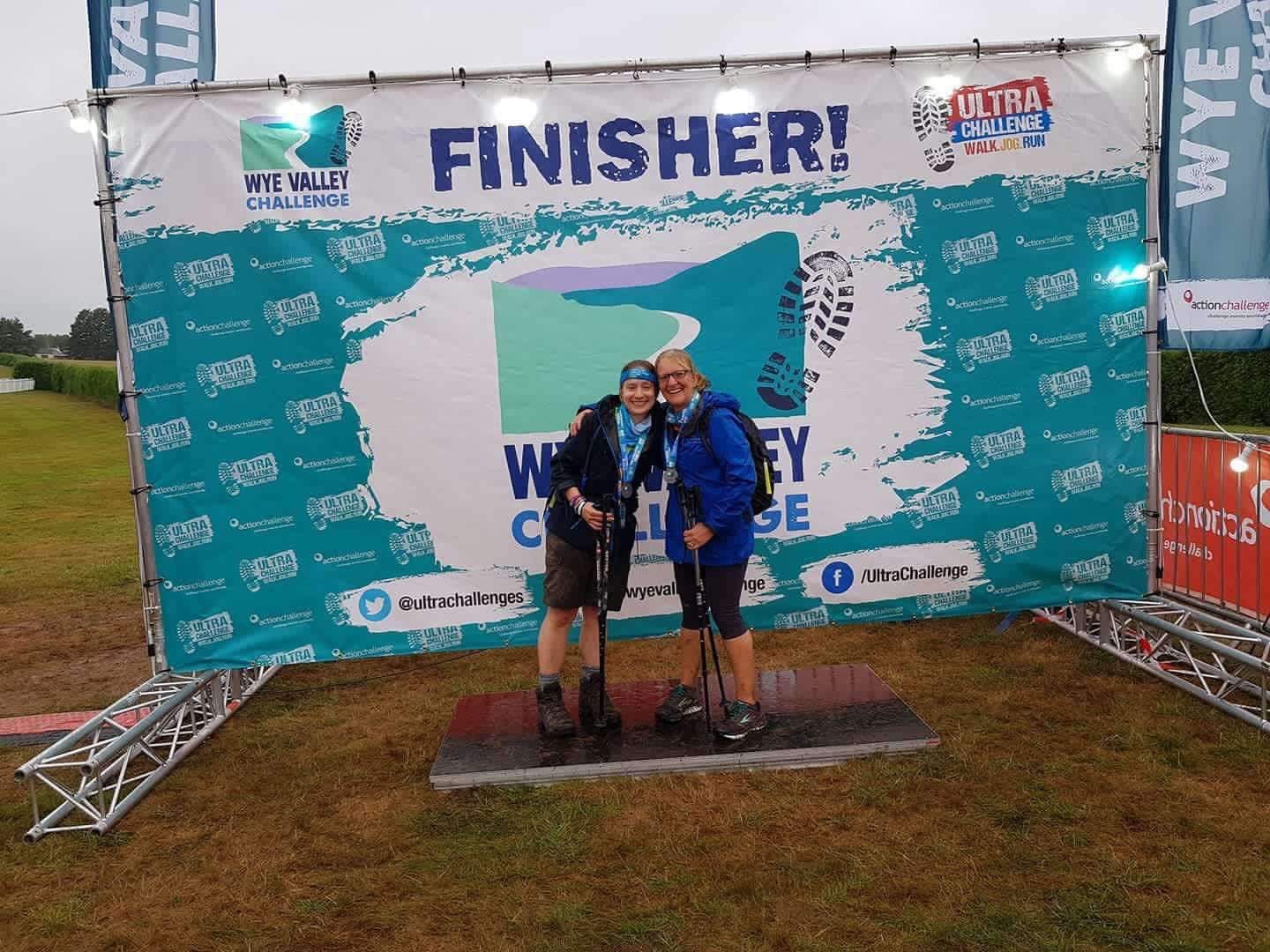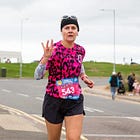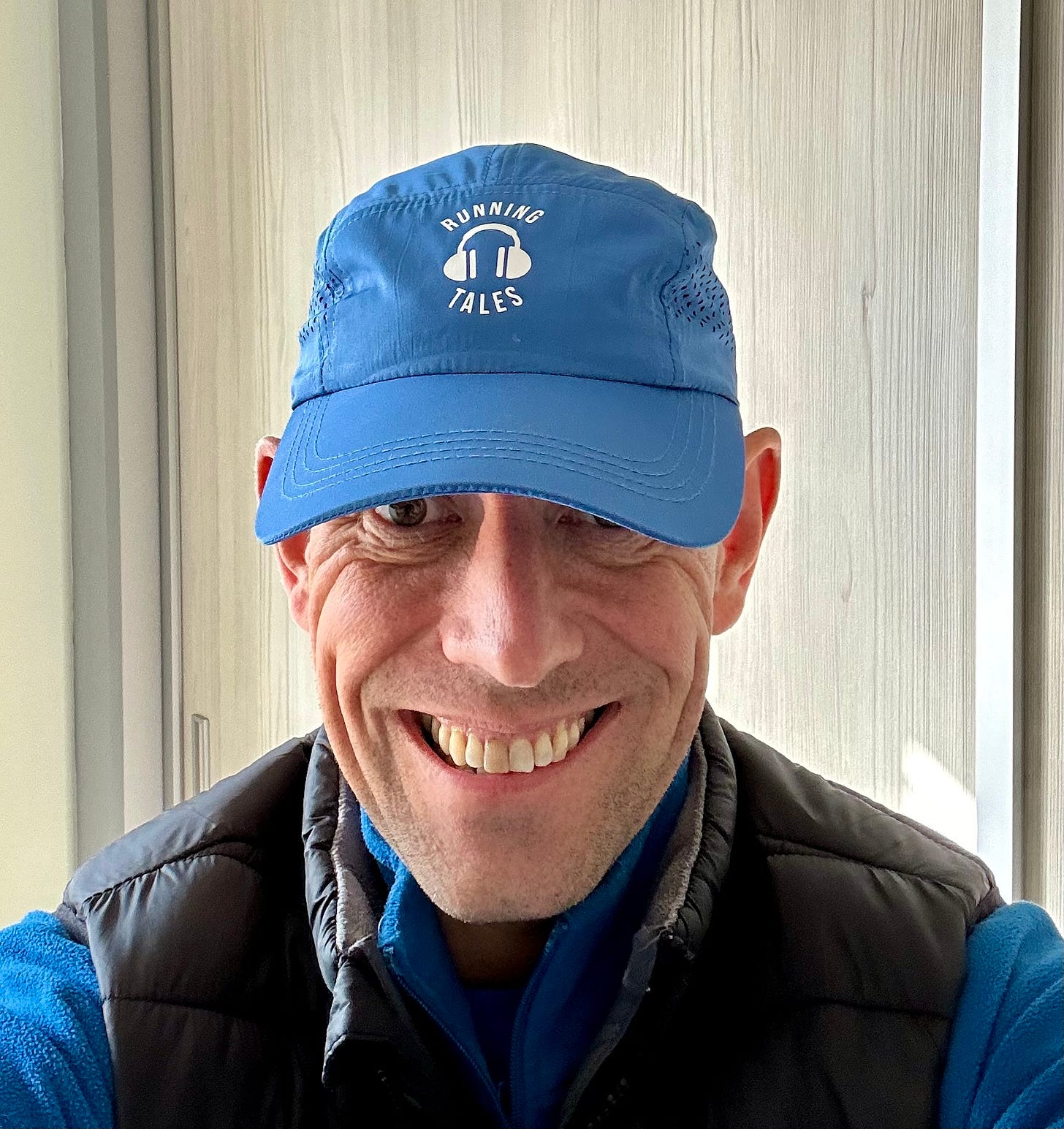The Paula Black story: Running long distances and fighting MND
At school, Paula hated PE - now she loves running, tackles 100k challenges and raises awareness of motor neurone disease
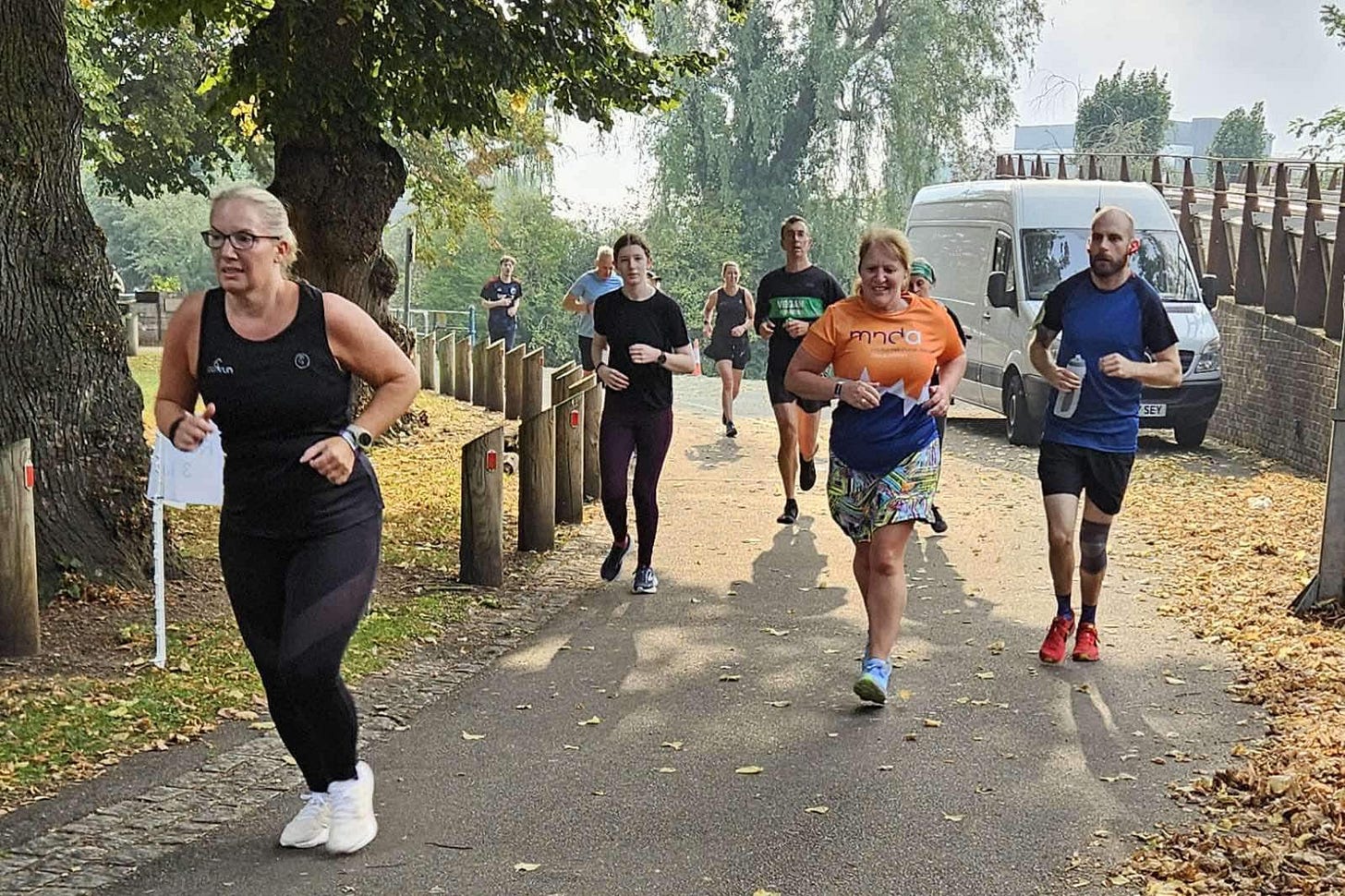
Running is a sport full of highs and lows.
From the joy of completing a target race or hitting a PB to the pain of injury or a DNF.
But few people will have encountered the ups and downs Paula Black has found since falling in love with the sport.
From meeting - and marrying - her husband while running, to losing him to motor neurone disease (MND) and going on to work to raise awareness of the condition, Paula’s experiences are as raw as they come.
Along the way she has achieved her dream of running the London Marathon - beating her race time target by two seconds, achieved a new marathon personal best on the back of hearing one of her former husband David Soloman’s favourite songs, and completed a string of 100km challenges.
It’s all a long way from her school days, when Paula developed a healthy dislike of all things running related - and the cold that came with it.
She told the Running Tales Podcast: “When I was at school, I hated PE.
“Back in the day, you used to just go out in the snow with your shorts and t-shirt on. And I used to stand there freezing, with blue legs, thinking, ‘I’m so cold, I just want to go inside’.
“I didn't realise that if I ran around I'd actually get warm.”
Despite running seeming like a punishment while she was at school, Paula had always dreamed of running the London Marathon.
She would watch it every year and imagine taking part. But Paula had always concluded that taking on the 26.2-mile distance would be beyond her.
“I was one of those really unfit people,” she said. “I used to sit on the sofa and I honestly thought that I could never do that. That was just for the elite athletes.”
It was watching other participants “crawling over the finish line” that finally persuaded her to take the plunge.
“It really inspired me,” she said. “They probably didn’t feel inspiring at the time but I felt if they can do it, so can I.”
Incredibly, Paula hit the London Marathon 2012 ballot jackpot and gained a place at the first time of asking.
It was the start of an amazing relationship with long-distance events that has seen complete London four times and finish 100km races including the Thames Path and London to Brighton challenges.
But her first steps into the world of running were somewhat more humble.
Almost dying and being ‘beaten by Blobby’:
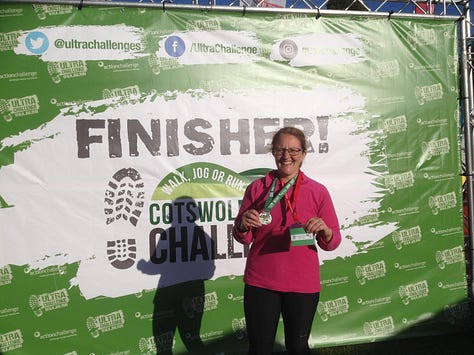
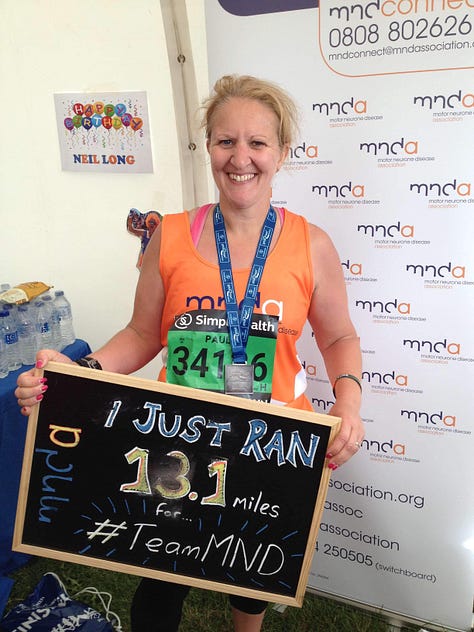
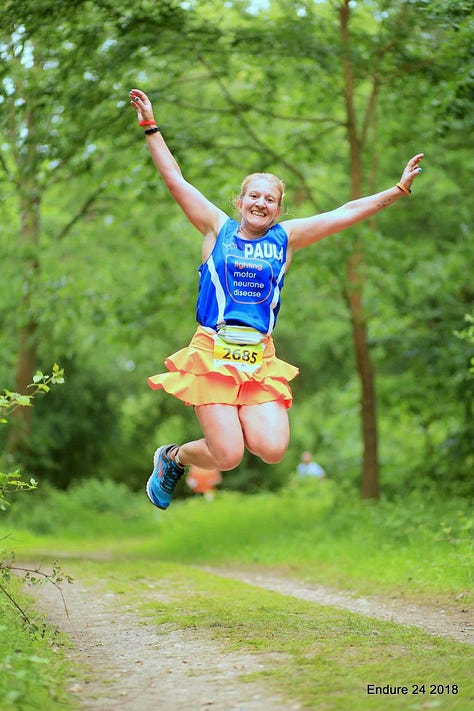
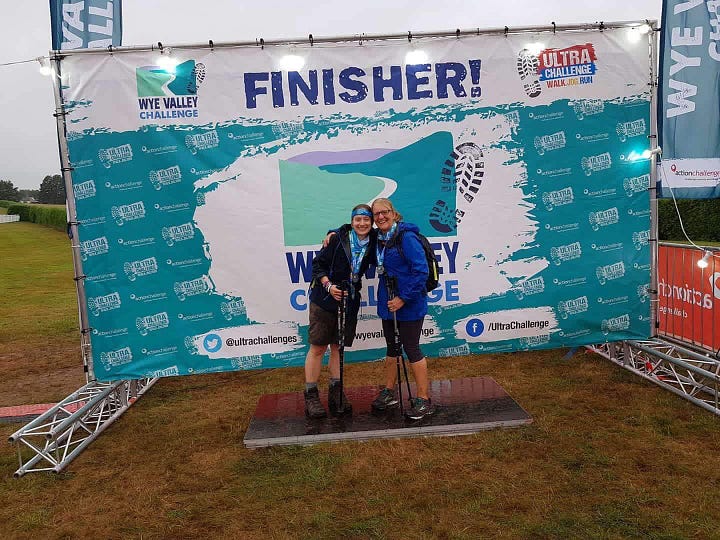
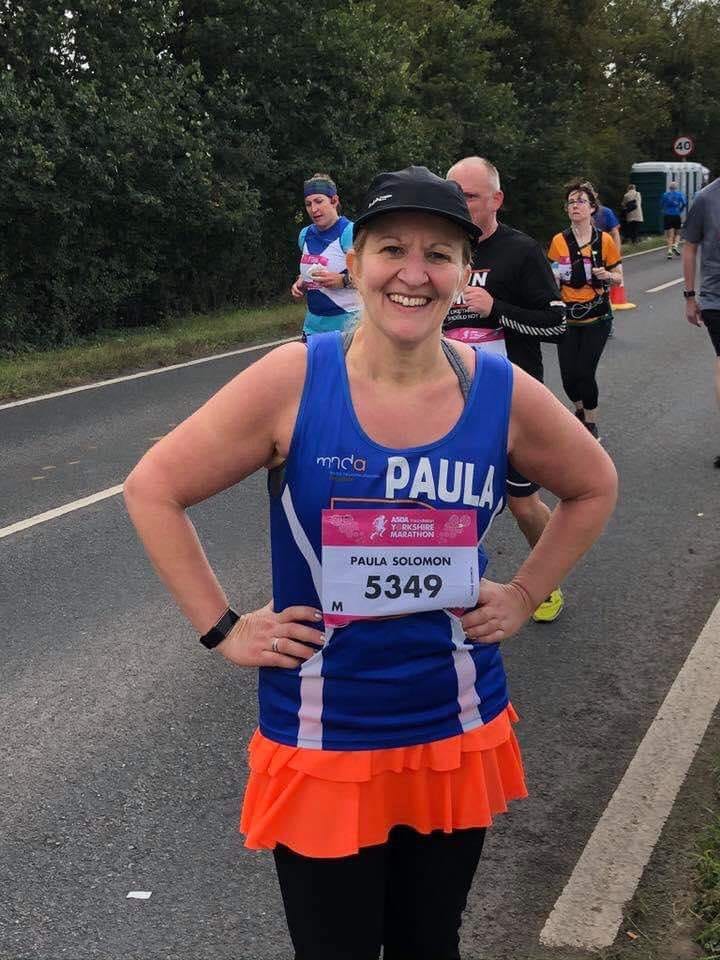
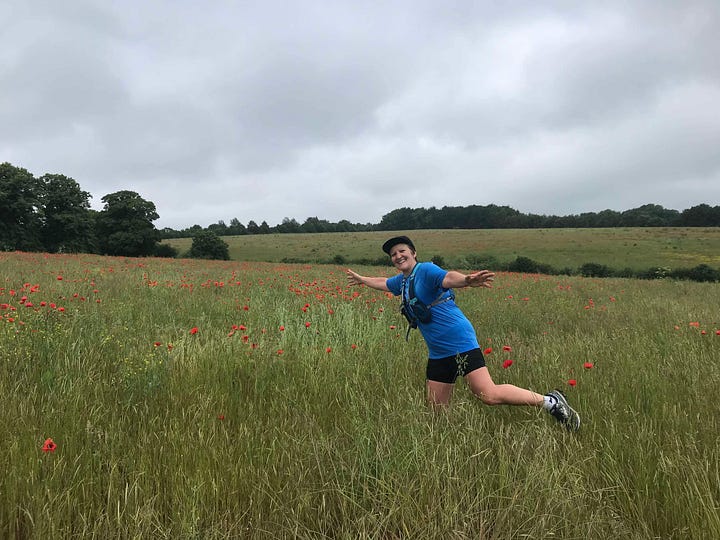
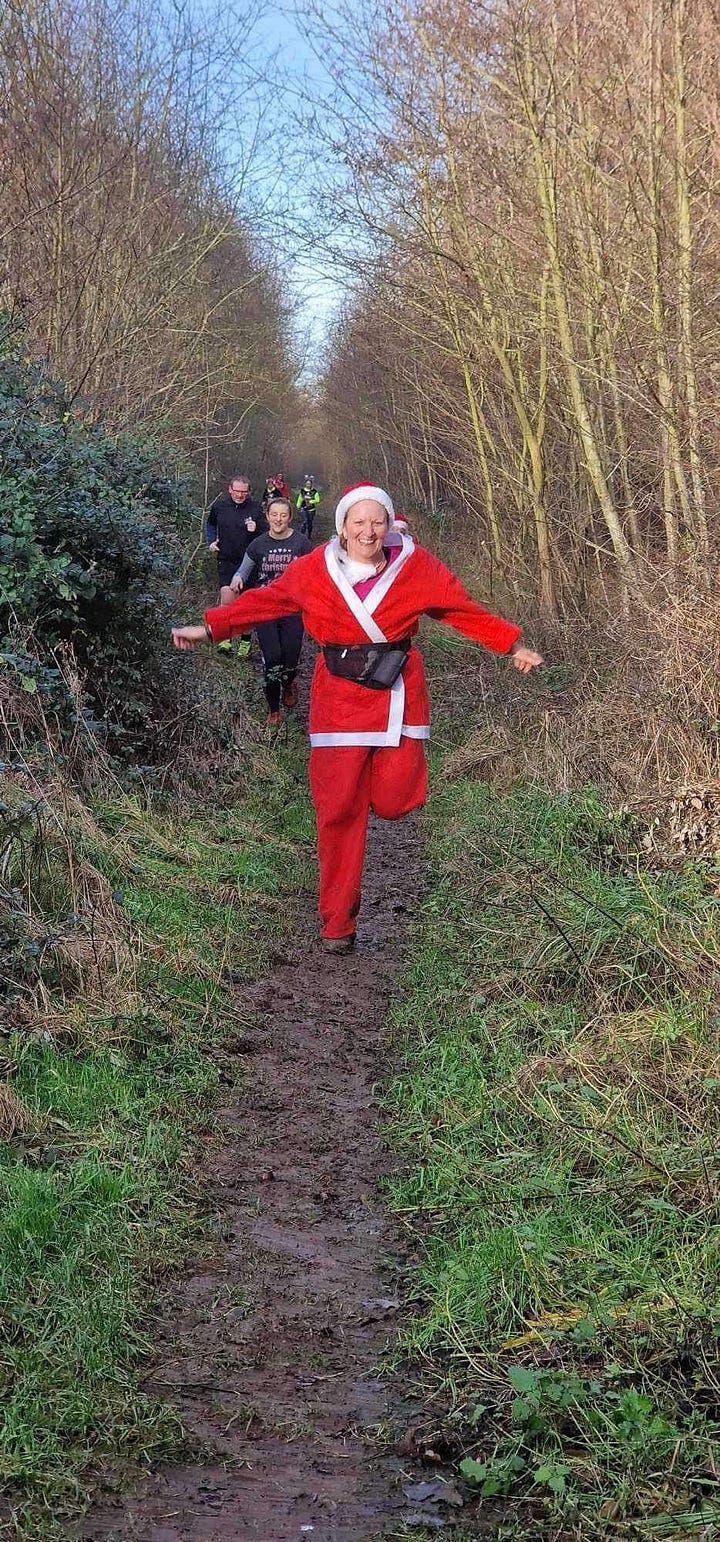
Paula’s initial forays into the sport came when her children were at nursery.
She started walking, and then jogging, the 1.7 miles to and from the nursery to drop them off and pick them up each day.
She said: “The first time, I honestly thought that I was going to die.
“It took me about 20-odd minutes to do it.”
A first race followed, the 2010 Race for Life, with two other mums from the nursery.
Paula loved the atmosphere of an event which she said left her “quite emotional and quite tearful” and incredibly proud of herself.
Spurred on by the camaraderie and support she found within the running community, she started entering more and more races.
Even a fell race during which she was overtaken by a man dressed in a giant inflatable Mr Blobby costume, and only avoided finishing last due to the kindness of another participant dressed as Mrs Brown from the BBC series of the same name, couldn’t put her off.
Her London Marathon journey saw her follow a rigorous training plan, running around 35 miles a week: “I used to go out on my own. I wasn't part of a club or anything.
“At that point, I didn't really have friends that ran, not that kind of distance anyway, so I used to hide drinks in the bushes, run a lap, have a drink, run a lap.
“And I could get to about 18 miles before I had to stop. I can't do that now, I have to say!”
Setting herself a target of finishing within five hours, Paula eventually lined-up at the start of the 2012 London Marathon.
An honest assessment of her abilities meant she was in the back pen - “lots of people lie about the time they’re going to race!” - and preparing to weave her way through the packed field.
“I actually ran 27-and-a-half miles because of the amount of weaving,” she said.
“The second time I did it, I realised that there's a blue line and if you stick to that, you run a lot less. So, I could have ran a lot quicker if I hadn't have put the extra miles in.”
Despite the extra distance, Paula achieved her time goal - just. She finished in four hours, 59 minutes and 58 seconds, two seconds within her target.
Despite the close call, she still managed to lap up the final stages of the race, high-fiving crowd members and soaking up the atmosphere.
More importantly, the race turned out to be everything she expected and more: “I was over the moon when I finished.
“I just cried. I didn't think straight away about running it again because it hurt a lot, and I pretty much collapsed at the end.
“I stood there for an hour and I was exhausted and all I wanted to do was sit down. So, I sat down.
“I could have been crushed, but people around me were lovely. Someone gave me a Pink Lady apple. That was the best apple. It tasted like the most delicious thing I could have eaten.”
Once the experience - and the apple - hit home, Paula knew she would be running London again.
Her love affair with the capital’s landmark race has now seen her finish it four times, returning in 2014, 2016 and 2019.
Meeting David - the ‘Carry On character’ who encouraged her up hills:
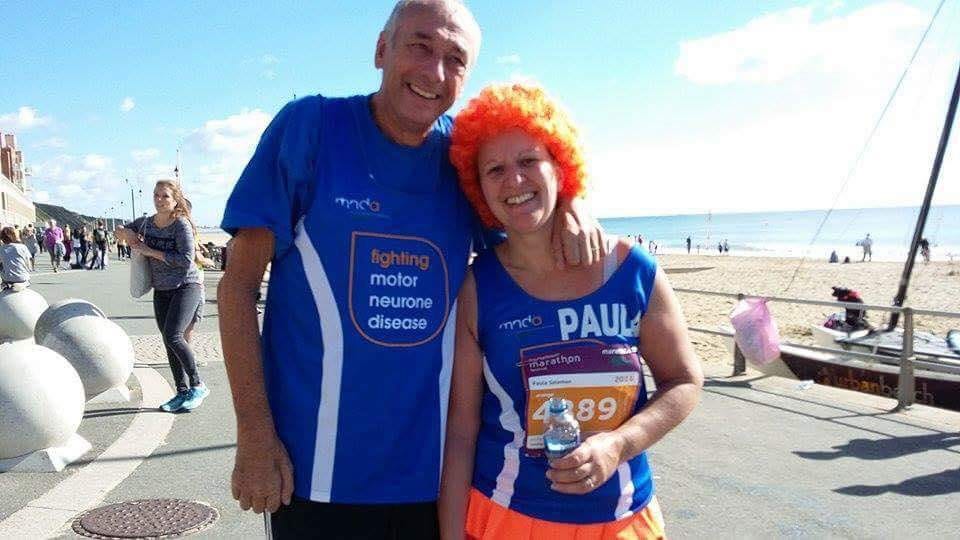
With her first London Marathon behind her, Paula joined a running club in her local town of Northampton in the UK.
It was there that she met her future husband David Solomon, a keen runner who had completed several marathons.
“David was the kind of person who would always run at the back of the group to make sure all the ladies were okay,” she told Running Tales.
“He was such a gentleman, he wasn't bothered about times or anything. I just remember thinking what a lovely man he was.”
During running sessions, David would push her to run further and encourage her up hills.
She said: “He gave me so much encouragement, but just not me, everybody.
“He used to like to dress up and he was quite eccentric. Nobody had a bad word to say against him.
“He was a bit like a character from a Carry On film.”
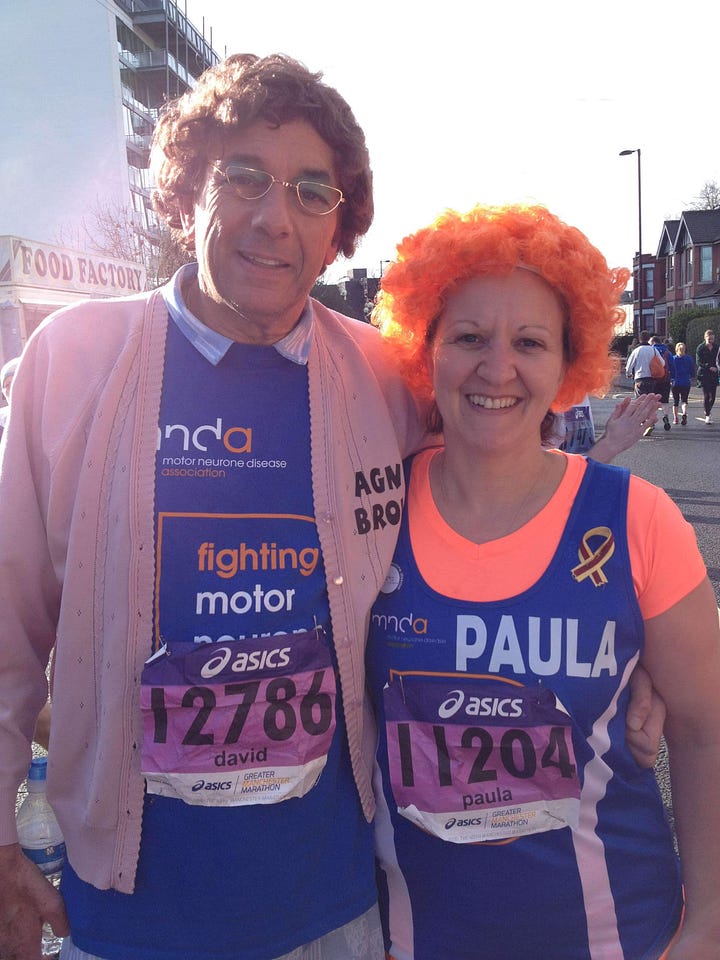
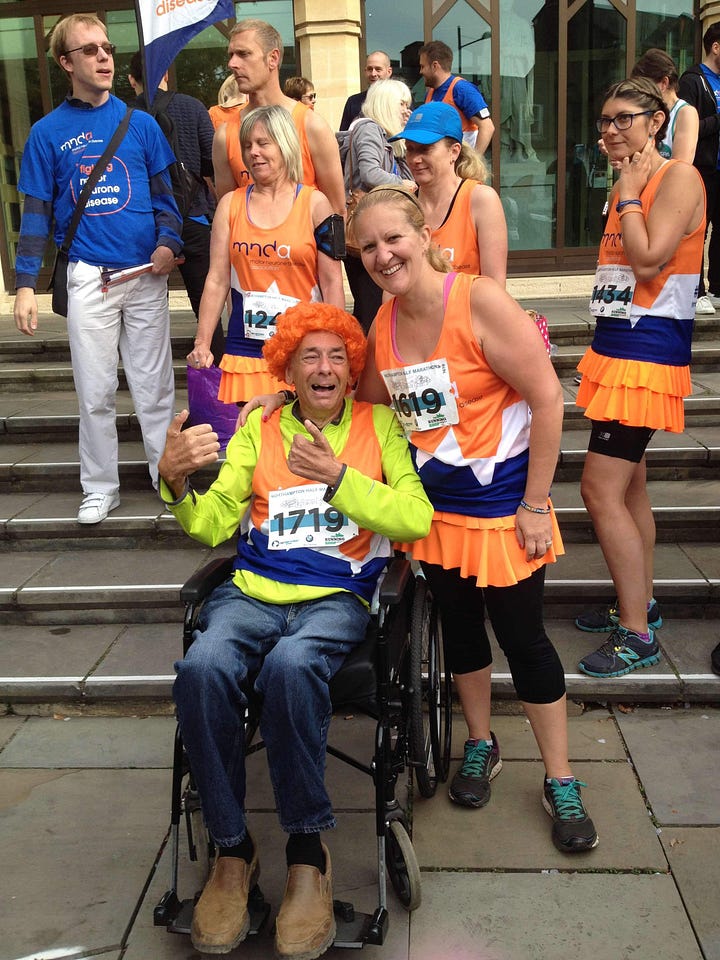

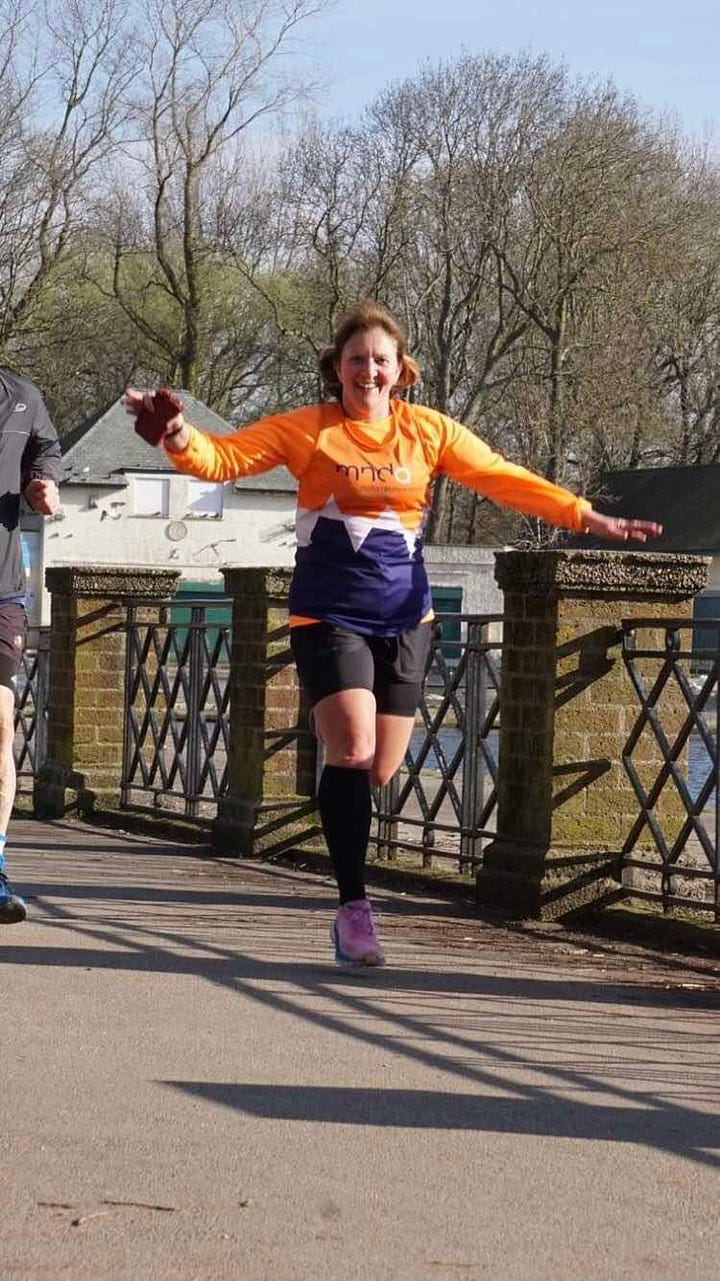
But Paula and David’s lives changed forever in 2014, when he received the news he had been diagnosed with MND.
“The first we knew about it was when he started getting twitching in his arms and that went on and on and on,” she said.
“I said he should go to the doctors as it wasn’t normal to have twitching like that.
“Then he started having problems with his hands. He couldn't use his fingers. I thought he was trying to get out of hanging the washing out!
“Eventually, he went to the doctors, they did loads and loads of tests. It took about 10 months for him to get diagnosed.
“Sadly, he was on his own when he finally was. I’d gone to give blood. I remember him saying he walked out of the hospital and he'd been given this big, thick book, and he just walked through the park on his own with it.
“He said nobody was about and he just fell to his knees and cried.
“When I got home, he was already sitting at home in the conservatory with a beer. He didn’t drink.
“He told me he had MND and gave me that book. I opened it up and the first thing it said was that he had two years to live.
“Getting a diagnosis like that, the grief starts straight away.”
After initially confronting an overwhelming feeling that David was already effectively dead, the pair decided they were going to take the disease on head-on.
They started fundraising and raising awareness, talking at conferences and taking part in a global awareness day.
It was then that Paula started to work for the MND Association, something she still does today as a Community Fundraiser.
“I was so passionate about it and Dave just wanted to help people,” she said.
Sadly, David passed away in 2018, but not until he had finished the Milton Keynes and Northampton half-marathons in his wheelchair, raising thousands of pounds for charity in the process.
And it David’s memory which helped power Paula to a London Marathon PB in 2019, as she finished in four hours 44 minutes.
After his death, and still juggling the pressures of work and a young family, Paula had struggled to find the time to train fully.
In fact, she’d only managed to train up to the half-marathon distance prior to the race, but as she listened to the warm-up music in the start pen, she felt David’s influence.
She said: “They were playing all this really motivational music and all of a sudden Always Look on the Bright Side of Life came on.
“It was totally out of character to the rest of the songs that they were playing. And I thought, ‘Dave's here with me’.
“He was such a character, always happy and he used to sing that all the time. He even made us play that at his funeral as he wanted everyone standing up, swaying their arms, singing Always Look on the Bright Side of Life.
“When that song came on [at the marathon], I knew he was there and that made me really emotional. I'm sure he had his hand on my back and pushed me around because at halfway I knew that I was going to get a PB.”
Paula was even able to drop off her own pace towards the end of the race to help another woman who was running for the MND Association.
“She was really struggling and I said to her, ‘I'm on for a PB, but it doesn't matter what I do, I can walk the rest and still get a PB so let's do this together’.
“We ran/walked it and crossed the line together. It was just so emotional.”
What is MND?
Motor neurone disease (MND) affects the nerves known as motor neurones. These nerves tell your muscles what to do and are found in the brain and spinal cord.
British physicist Stephen Hawking - pictured - is among the well known people to have contracted the disease, along with baseball player Lou Gehrig, actor David Niven, and rugby players Doddie Weir and Rob Burrow.
Another emotionally charged moment came in 2023 when Paula completed the Rob Burrow Leeds Marathon.
Former Leeds Rhinos, England and Great Britain rugby league star, Burrow, had contracted MND after retiring from the sport.
His former team mate Kevin Sinfield has since completed a series of gruelling marathon and ultra marathon challenges to raise money for and awareness of the disease.
The Leeds Marathon was also named in Burrow’s honour, and Paula remembers meeting him after the race.
“He was sitting outside with his dad, waiting for a lift home in his wheelchair,” she said.
“By this time, he couldn't speak, but when I said it was a brilliant race but could he cut the hill at the end out, he gave me the loveliest smile.
“I hold that in my heart all the time. I could see the twinkle in his eye. He was just such a wonderful man.”
Sadly, Burrow passed away in June, aged just 41, but he has left a profound legacy with millions raised in his name for the MND Association and people all over the world touched by his story.
Paula the ultra runner:
By this point, fuelled by a love of running and her desire to promote awareness of MND, Paula had graduated into ultra running.
In all, she has now completed six continuous 100km events under the Action Challenge banner: The Thames Path, Cotswold Way, Wye Valley, London to Brighton, Yorkshire and Peak District challenges.
She said: “I mainly walk them, but I do a bit of running as well and just try and beat my time.
“They’re not nice little flat paths that you walk along. They're challenging, they really are.
“But with the food stops you get on these challenges and the welcome from the volunteers, they're just such well organised, fabulous events.
“I often do them on my own because I can just stop and talk to everybody.
“I've made friends on these challenges. It’s all about support and helping people get through tough times.”
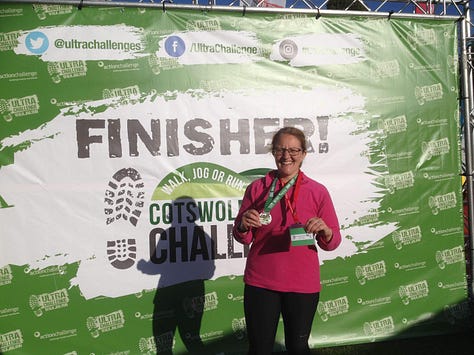
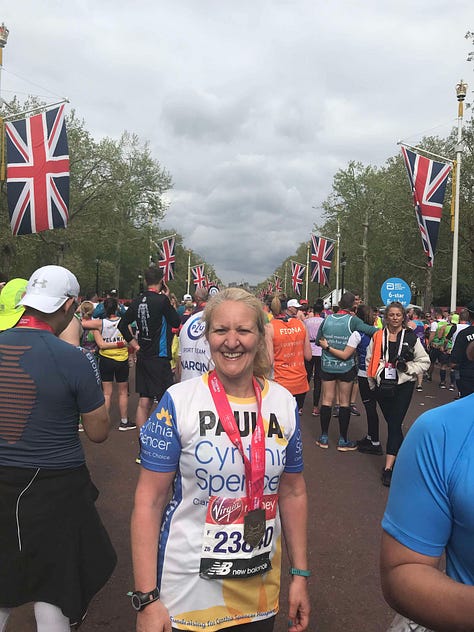
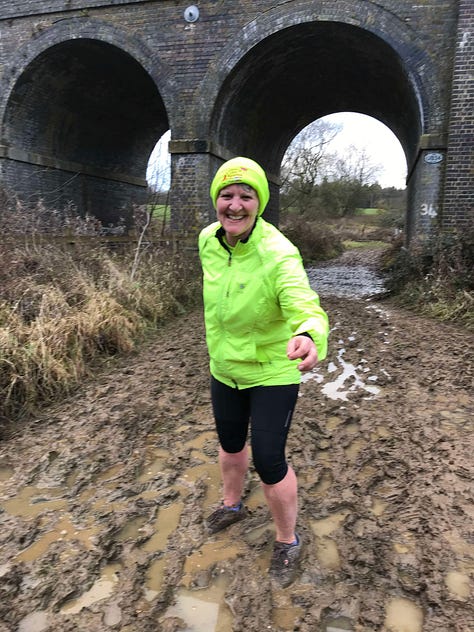
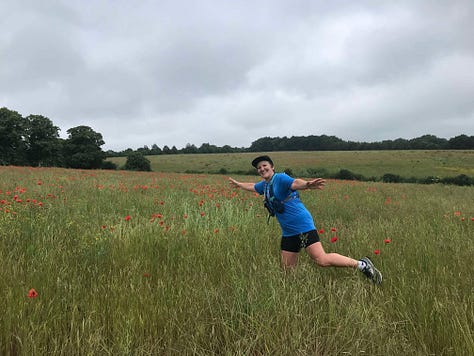
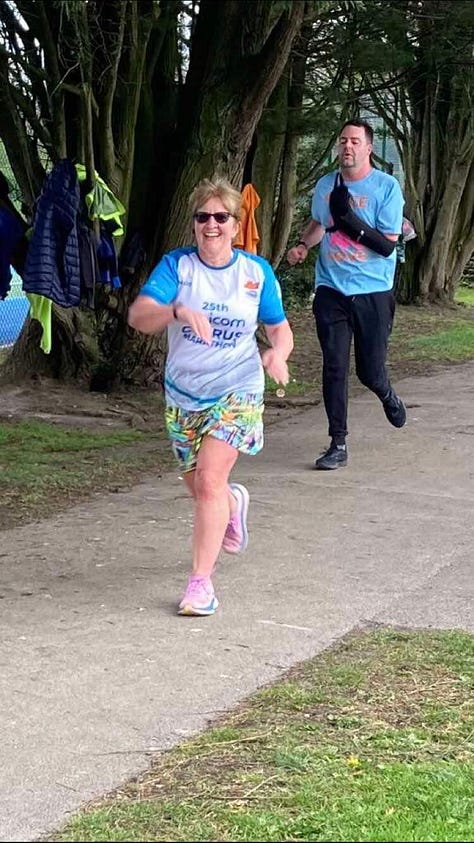
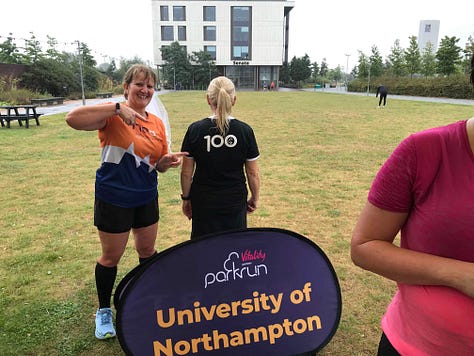
Despite largely walking the events, Paula has still managed to finish each one in under 24-hours.
She said: “I have this strategy where in the first half, up until night time, I will walk at four miles an hour. And that's quite a challenge for 32 miles.
“At halfway, 50k, I’ll stop, brush my teeth, wash my face, freshen myself up, change my clothes and then I know that I can slow down to about two miles an hour because in the night I pretty much sleepwalk.
“People think walking is easy, but walking 62 miles is hard. You’ve got to have the mental capacity.”
That ability is something Paula has in spades, honed by those running and life highs and lows.
She credits the support and community running has provided for giving her the strength to keep moving forward.
“I enjoy running with my friends on a Sunday morning,” she said.
“I like to have a look around, see the beautiful scenery. I love being out in the countryside. I love being out in the fresh air.
“It's so good for your mental health. I can go out and be not in the mood, but half of the battle is getting over that front door.
“I couldn't have got through some of what I've been through without the friendships I've made through running and the support I’ve had.
“I've got all my medals just inside the door. So, whenever I open the door I see them and I think, ‘yeah, I didn't win any races, but I won because I entered’.”
Watch and listen to Paula on the Running Tales Podcast:
Watch on Facebook, Instagram or on YouTube.
Listen on Spotify and Apple Podcasts.
Support Running Tales:
Please help us keep producing Running Tales across Substack and in podcast form:
Also on Running Tales:
Check out our merchandise:
The merch is better than the model:
Be a part of the Running Tales revolution with our new merchandise range.
We’ve got buffs, caps, cups, t-shirts and hoodies - why not complete your next run as an everyday runner by doing extraordinary things?





